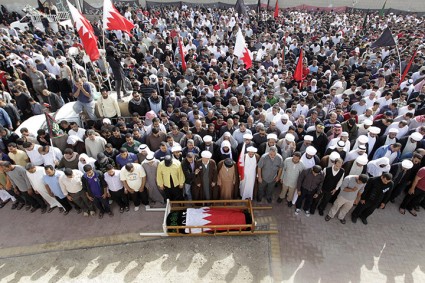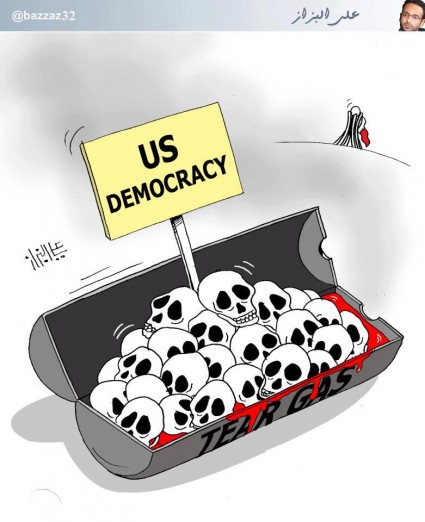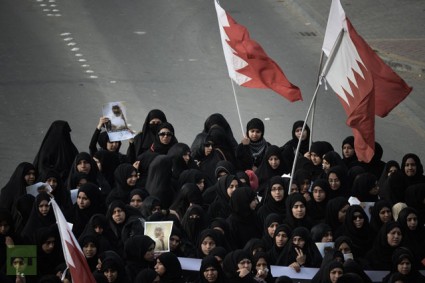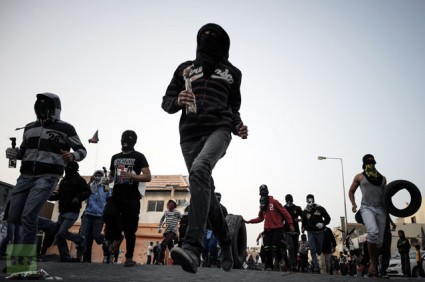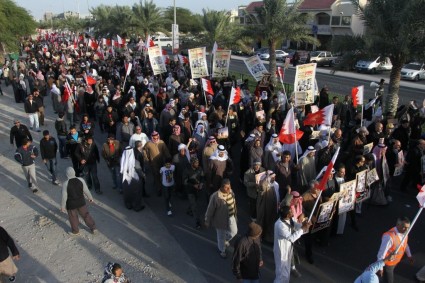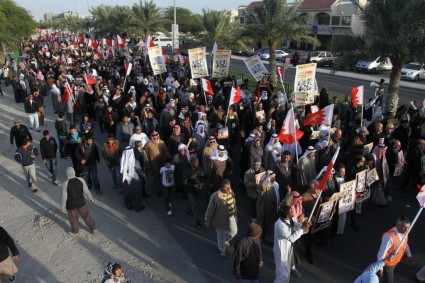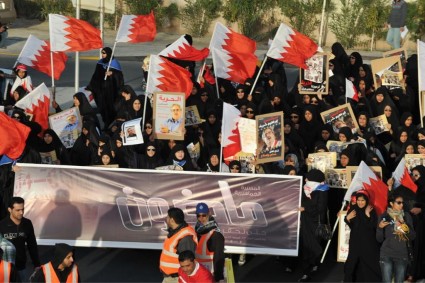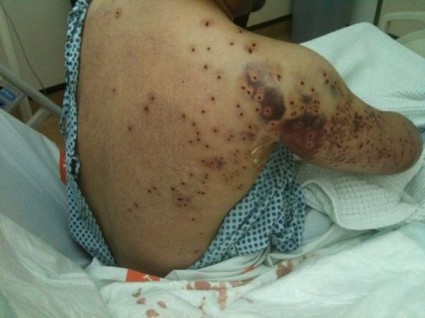Posts from — January 2013
US, Al Qaeda nexus in US directed war in Syria as Al-Qaeda chief’s brother arrested in Syria
Al-Qaeda chief’s brother arrest in Syria, Proves the nexus of US and Al Qaeda
7 January, 2013 – Jafria News
Al Qaeda Leader’s Brother Muhammad Al ZawahiJNN 07 Jan 2012 Damascus : The Arrest of Muhammad Al Zawahiri The brother of al-Qaeda’s head Ayman al-Zawahiri by Syrian military forces in the city of Dara’a, southwest of the capital Damascus, clearly proves that the US and Saudi Governments which on record are sponsoring Insurgency in Syria , are not only Destabilizing the region , but are also the sponsors and Creators of Al Qaeda, and Promoting Terrorism world wide through Their Proxies Like Al Qaida and Taliban.
The 59-year-old Mohamed al-Zawahiri was arrested while he was meeting opposition militants in Dara’a, the English newspaper The Independent reported on Friday.
According to the daily, Western intelligence agencies fear the arrest could lead to the detention of more al-Qaeda members in Syria.
Zawahiri spent 14 years in prison in Egypt on charges of being involved in the assassination of former president Anwar Sadat in 1981 and taking part in terrorist acts.
Ayman, 61, became the head of al-Qaeda in 2011. In May 2011, US Navy SEALs claimed they killed former al-Qaeda leader Osama bin Laden in Pakistan.
Ayman has called for military action against the Syrian government.
Reports say hundreds of al-Qaeda terrorists are active in Syria under the banner of the al-Nusra Front group.
Last month, the US State Department designated the al-Nusra Front group as a terror organization linked to al-Qaeda in Iraq.
Turkey, Qatar, and Saudi Arabia are reportedly arming and funding militants fighting the Damascus government to implement Western plans in the Arab county.
Syria has been experiencing unrest since mid-March 2011. Many people, including large numbers of security personnel, have been killed in the violence.
The Syrian government says the chaos is being orchestrated from outside the country, and there are reports that a very large number of the militants fighting the Syrian government are foreign nationals.
Several international human rights organizations have accused the foreign-sponsored militants of committing war crimes. …source
January 15, 2013 No Comments
Security Forces desecrate funeral of Haj Habib Ibrahim Abdullah murdered by Police only days before
Western puppet Bahraini forces attack mourners
14 January, 2013 – Islamic Invitation Turkey
Saudi-backed Bahraini forces have clashed with anti-government protesters at the funeral of a demonstrator, killed by regime forces near Manama.
The clashes broke out on Sunday after Bahraini security forces fired tear gas and birdshot to disperse peaceful protesters, who had attended the funeral of Haj Habib Ibrahim Abdullah.
Abdullah died earlier in the day after inhaling poisonous teargas, fired at a peaceful anti-regime protest in the Malkiya village. The protester’s nine-year-old grandson was also injured in the incident.
The protesters called for the release of all jailed activists and demanded that King Hamad bin Isa Al Khalifa step down.
Since mid-February 2011, thousands of pro-democracy protesters have staged numerous demonstrations in the streets of Bahrain, calling for the Al Khalifa royal family to relinquish power.
On March 14, 2011, troops from Saudi Arabia and the United Arab Emirates invaded the country to assist the Bahraini government in its crackdown on the peaceful protesters.
According to local sources, scores of people have been killed and hundreds arrested.
Physicians for Human Rights says doctors and nurses have been detained, tortured, or disappeared because they have “evidence of atrocities committed by the authorities, security forces, and riot police” in the crackdown on anti-government protesters. …source
January 15, 2013 No Comments
Endgame in Syria: Strategic Stage in the Pentagon’s Covert War on Iran
The ultimate goal in Syria, this pundit argues, is not regime change per se, but to do whatever it takes that will result in Iran’s isolation in the region. Believing that they have succeeded in neutralizing Tehran’s allies in the Levant: Syria, Hezbollah, and Hamas, the opponents of Iran will be concentrating now on subduing her supporters in Iraq. Revealing the endgame behind the plans for Syria, an Israeli intelligence report has signaled that Iran can now be attacked without coordinating a regional response. Meanwhile, there is a clock ticking in Washington which may be chiming a different tune.
The Endgame in Syria: Strategic Stage in the Pentagon’s Covert War on Iran
by Mahdi Darius Nazemroaya – Voltaire Network – 10 January, 2013
Since the kindling of the conflict inside Syria in 2011, it was recognized, by friend and foe alike, that the events in that country were tied to a game plan that ultimately targets Iran, Syria’s number one ally. [1] De-linking Syria from Iran and unhinging the Resistance Bloc that Damascus and Tehran have formed has been one of the objectives of the foreign-supported anti-government militias inside Syria. Such a schism between Damascus and Tehran would change the Middle East’s strategic balance in favour of the US and Israel.
If not accomplishable, however, then crippling Syria to effectively prevent it from providing Iran any form of diplomatic, political, economic, and military support in the face of common threats has been a primary objective. Preventing any continued cooperation between the two republics has been a strategic goal. This includes preventing the Iran-Iraq-Syria energy terminal from being built and ending the military pact between the two partners.
All Options are Aimed at Neutralizing Syria
Regime change in Damascus is not the only or main way for the US and its allies to prevent Syria from standing with Iran. Destabilizing Syria and neutralizing it as a failed and divided state is the key. Sectarian fighting is not a haphazard outcome of the instability in Syria, but an assisted project that the US and its allies have steadily fomented with a clear intent to balkanize the Syrian Arab Republic. Regionally, Israel above all other states has a major stake in securing this outcome. The Israelis actually have several publicly available documents, including the Yinon Plan, which outline that the destruction of Syria into a series of smaller sectarian states is one of their strategic objectives. So do American military planners.
Like Iraq next door, Syria does not need to be formally divided. For all intents and purposes, the country can be divided like Lebanon was alongside various fiefdoms and stretches of territory controlled by different groups during the Lebanese Civil War. The goal is to disqualify Syria as an external player.
Since 2006 and the Israeli defeat in Lebanon in that year there was renewed focus on the strategic alliance between Iran and Syria. Both countries have been very resilient in the face of US designs in their region. Together both have been key players for influencing events in the Middle East, from the Eastern Mediterranean to the Persian Gulf. Their strategic alliance has undoubtedly played an important role in shaping the geo-political landscape in the Middle East. Although critics of Damascus say it has done very little in regard to substantial action against the Israelis, the Syrians have been the partners within this alliance that have carried the greatest weight in regards to facing Israel; it has been through Syria that Hezbollah and the Palestinians have been provided havens, logistics, and their initial strategic depth against Israel. …more
January 15, 2013 No Comments
She who is prudent and lies in wait for an enemy who is not, will be victorious. – Sun Tzu
January 14, 2013 No Comments
Who knew the CIAs Democracy planned for Bahrain came in a Tear Gas Canister?
January 14, 2013 No Comments
US State Department appears “brain dead” and “grossly misinformed” on Bahrain – maybe its a CIA operation?
U.S. State Department to investigate detention of U.S. citizen in Bahrain
9 January, 2013 – Mary Fletcher Jones – Human Rights in Bahrain
elise labottOn Monday, CNN foreign affairs reporter Elise Labott brought the State Department’s attention to the plight of a U.S. citizen, Taqi Abdulla, who has been detained by Bahraini authorities.
The Bahrain Center for Human Rights reported in its blog that Mr. Abdulla had been detained for more than a month as of November 30, 2012. The human rights organization called on the United States to intervene on his behalf, to ensure that he has proper legal representation and medical care for his needs, and that an investigation regarding allegations of his torture and mistreatment be conducted.
According to EA Worldview, Mr. Abdulla, who is 24, was born in Connecticut and has lived in Sanabis, Bahrain, since 2002, with his mother. Authorities have accused him of throwing a molotov cocktail in the direction of riot police; Mr. Abdulla contends he was at home. Since his arrest by Bahraini authorities who raided his home, masked, in the middle of the night, allegedly, he has been beaten and threatened with rape, and has been denied access to medication he needs.
The January 7, 2013 press briefing, presided by spokesperson Victoria Nuland, is as follows…
QUESTION: Do you have anything on the case of Taqi Abdulla (inaudible), who apparently is an American citizen, could be a dual Bahraini-American national, who’s been detained, allegedly tortured in prison? I understand the Embassy knows about the case.
MS. NULAND: I don’t have anything today on this case. Let me see what I can get for you, Elise.
QUESTION: Apparently, he’s been – he was arrested in October, and not only was he detained and abused in prison, but apparently his family was also roughed up.
MS. NULAND: And he’s an American citizen, you believe?
QUESTION: I think he might be a dual national, but there is an American citizenship.
MS. NULAND: Okay. So we’ll get more information for you. …source
January 14, 2013 No Comments
Reflection on Leadership – Maryam al-Khawaja Oslo Freedom Forum 2011
January 14, 2013 No Comments
The war against the Shia catches all in its crossfire
The war against the Shia catches all in its crossfire
Patrick Cockburn – 13 January, 2013 – The Independent
It is a ferocious war waged by assassination, massacre, imprisonment and persecution that has killed tens of thousands of people. But non-Muslims – and many Muslims – scarcely notice this escalating conflict that pits Shia minority against Sunni majority.
The victims of the war in recent years are mostly Shia. Last week a suicide bomber walked into a snooker club in a Shia district of Quetta in Pakistan and blew himself up. Rescue workers and police were then caught by the blast from a car bomb that exploded 10 minutes later. In all, 82 people were killed and 121 injured. “It was like doomsday,” said a policeman. “There were bodies everywhere.”
Responsibility for the bombing was claimed by the banned Lashkar-e-Jhangvi, a Sunni fundamentalist group behind many such attacks that killed 400 Shia in Pakistan last year.
The dead in Quetta come from the Shia Hazara community, many of whom migrated from Afghanistan in the last century. “They live in a state of siege,” says Ali Dayan Hasan, of Human Rights Watch. “Stepping out of the ghetto means risking death. Everyone has failed them – the security forces, the government, the judiciary.” In this they are little different from the 30 million Shia in Pakistan who are increasingly beleaguered and afraid in the midst of a rising tide of anti-Shia sectarianism.
The atrocity in Quetta will soon be forgotten outside the area ,but the victims were not the only Shia community to come under attack last week. In Bahrain, where the Shia majority is ruled by the Sunni al-Khalifa royal family, the high court confirmed prison sentences – including eight life sentences – on 20 activists who took part in the pro-democracy protests in 2011. This happened even though the original sentences were passed by military courts using evidence extracted by torture.
The sectarian nature of what is happening in Bahrain has never been in doubt. At the height of the crackdown the Bahraini security forces bulldozed 35 Shia mosques, husseiniyas (religious meeting houses) and holy places. The authorities claimed that they were inspired by a sudden enthusiasm to enforce building regulations despite the political turmoil.
Sunni-Shia friction has a long history but took its most vicious form after the overthrow of the Shah by Ayatollah Khomeini in 1979 and the creation of a revolutionary theocratic Shia state in Iran. The Iran-Iraq war of 1980-88 appeared to end Iranian hopes of spreading the revolution to its neighbour, but after the US invasion of 2003 – to the dismay of the White House and to the horror of Saudi Arabia – Iraq became a Shia-run state. “We are the first Arab state to be controlled by the Shia since the Fatimids ran Egypt 800 years ago,” one Iraqi Shia activist exulted to me at the time.
As a result of the Sunni-Shia civil war in Iraq in 2006-07, Baghdad became an overwhelmingly Shia city. The Sunni in the capital increasingly lived in ghettos. The government, army, police and judiciary came under Shia control. Across the Middle East, the Shia appeared to be on a roll, exemplified by Hezbollah’s success in withstanding the Israeli attack on Lebanon in 2006. In Afghanistan the traditionally down-trodden Shia Hazara community flourished after of the defeat of the Taliban. However, the overall extent of the Shia success was exaggerated: in most Muslim countries the Shia form a vulnerable minority. In the last two years the Shia revolution has been succeeded by a Sunni counter-offensive. The Shia democratic uprising was crushed in Bahrain, and Hezbollah wonders how it will fare if, in future, it faces a hostile Sunni government in Damascus. Until a few months ago the sectarian and ethnic balance of power in Iraq looked stable, but prophecies of a Sunni takeover in Syria are having destabilising consequences.
The uprising in Syria is not so far wholly sectarian, but is on its way to becoming so. Shia and Alawite villagers flee as the rebel Free Syrian Army moves in. A video posted on YouTube shows rebels ransacking and burning a Shia husseiniya outside Idlib in north-west Syria.
All this leaves the US and its Western allies with new dilemmas. In 2003 the US found that in Iraq it had opened the door to Iran by overthrowing Saddam Hussein. Its solution was to try to keep power itself in Iraq through an old-fashioned occupation, but this failed disastrously. From 2007 it adopted a new strategy known by some in the White House as the “redirection”, making US policy more militantly anti-Iranian and pro-Saudi and, therefore, inevitably more pro-Sunni and anti-Shia.
In a revelatory piece in the New Yorker in 2007, Seymour Hersh described how this “redirection” has moved “the United States closer to an open confrontation with Iran, and, in parts of the region, propelled it into a widening sectarian conflict between Shia and Sunni Muslims”. Iran, strengthened by the outcome of the US invasion of Iraq, was demonised as a greater threat than the Sunni radicals. Its allies, Hezbollah and Syria, were targeted for clandestine operations. Hersh says “a by-product of these activities has been the bolstering of Sunni extremist groups that espouse a militant vision of Islam and are hostile to America and sympathetic to al-Qa’ida.”
In fact the main al-Qa’ida franchises in Iraq and Pakistan have always been more enthusiastic about killing Shia than killing Americans. The success of the Arab Spring movements was in part owing to the new willingness of Washington to tolerate the Muslim Brotherhood taking power, judging that this would not open the door to jihadis seeking to wage holy war. …more
January 14, 2013 No Comments
Bahrian Courts of Injustice simply a tool of regime’s repression
Activist: Manama Regime Using Bahrain Judiciary as Means of Suppression
13 January, 2013 – ABNA
TEHRAN (FNA)- A prominent human rights activist deplored the Bahraini judiciary system’s blind obedience to the ruling regime, saying that the country’s judicial body has become a tool in the hands of the al-Khalifa regime for suppressing the people.
“The verdicts made by Bahraini courts against revolutionary elements are completely political and have been issued only because these people have expressed their opinions,” Member of Bahrain Forum for Human Rights Falah Rabi said.
“The developments in Bahrain demonstrated the regime’s instrumental use of the judiciary system for suppressing people and shows the system’s lack of independence because most of the members of the high court are from the ruling family,” he added.
But, the Bahraini nation wants a democratic system in which all the branches of power take their legitimacy from people’s votes, he stressed.
His remarks came after Bahrain’s highest court rejected earlier this month the jailed activists’ appeal and upheld their sentences for their roles in anti-regime protests in 2011.
The UN, the EU, Britain, France, and human rights groups have criticized a Bahraini court decision upholding prison terms for 13 pro-democracy activists, including eight life sentences.
UN Secretary General Ban Ki-moon “deeply regrets the decision of Bahrain’s Court of Cassation on January 7 to uphold the harsh sentences, including life imprisonment” for the activists, the UN chief’s spokesman said, Al Manar reported.
“He reiterates his firm belief that the only way to promote peace, stability, justice and prosperity in Bahrain is through a national dialogue which addresses the legitimate aspirations of all Bahrainis,” Martin Nesirky stated.
“The secretary general also calls on the government of Bahrain to follow through on its recently reiterated commitment to judicial reform,” he added.
The European Union also criticized the court ruling, saying the pro-democracy activists should be given amnesty.
“The EU has repeatedly asked the Bahraini authorities to consider an amnesty for all those arrested last year and tried on charges relating to the expression of their political opinion,” the spokesman of EU foreign policy chief Catherine Ashton, Michael Mann, said. Mann stated that the EU “remains concerned about the lack of advancement of national reconciliation”.
Joe Stork, the deputy director of Human Rights Watch’s Middle East and North Africa division, said the Bahraini court “has proven its inability to protect the most basic rights guaranteed in Bahrain’s constitution and the international treaties it has signed”.
“The mind-boggling verdicts in these cases did not mention a single recognizable criminal offence, instead pointing to speeches the defendants made, meetings they attended, and their calls for peaceful street protests in February and March 2011,” he said in a statement. …more
January 14, 2013 No Comments
Saudi Shia Genocide steps-up as LeJ steps-in to agitate growing regime instability
4 Bomb Blasts , 93 Martyred above 150 injured by LeJ Terrorist in Quetta , Army Still Indecisive to take action against the Terrorists
Jafria News – 11 January, 2013
Sit in with the Shuhuda Bodies in Quetta: A string of bombings left at least 93 people dead and over 150 wounded in one of the bloodiest days of violence that Balochistan has seen for years.Majority of the Martyred Belonged to Shia Community .
“A suicide bomber detonated the explosives inside a crowded snooker club on Alamdar Road, a Shia-dominated neighbourhood of Quetta,” Home Secretary Akbar Hussain Durrani told Our Correspondent.
“Fifteen minutes later, another explosion went off outside the club as police, media persons and rescuers rushed to the site,” Durrani added.
A senior police official said 81 people were killed and 121 injured – some of them critically. “The fatalities include a television journalist and cameraman, eight police officials and five Edhi volunteers,” Mir Zubair Mehmood, the capital city police officer (CCPO), told a news conference.
The two media men were identified as Samaa TV reporter Saifur Rehman Baloch and Imran Sheikh.
Hamid Shakeel, the deputy inspector general of police (Investigation Branch), said the snooker club was situated in the basement of a four-storey building which collapsed with the impact of the blast.
Moments before the blast, the home secretary said, a man was seen carrying a bag into the crowded snooker club. The man is suspected to be a suicide bomber.
As soon as media persons, police and rescue officials reached the site, the second blast went off. Television channels counted the two explosions as suicide attacks. But the home secretary later described the second as a time device that was planted in a car. Most of the casualties were caused by the second blast.
The bombings disrupted power supplies and plunged the Alamdar Road neighbourhood into darkness. The area is dominated by the Shia Hazara community .
Lashkar-e-Jhangvi claimed responsibility for the blast and said their target was the Hazara community.
A spokesperson for the Terrorist group told Quetta-based journalists in a phone call that the first one was a suicide blast and the second was a planted bomb.
The casualties were driven to the Civil Hospital where a state of emergency was already declared. Dozens of injured are in critical condition, medics said, adding that the death toll could rise.
“We have enough life-saving medicine to treat the injured,” Health Department official Dr Saleem told The Express Tribune.
After the Alamdar Road blast, there were two more blasts on Prince Road, which is part of the commercial district of Quetta, whipping up fear and panic among residents. …more
January 14, 2013 No Comments
Saudis wither from Petraeaus Doctrine of hiring al-Qaeda Wahbbists mercenaries in domestic blow-back disaster
Is Saudi Arabia renewing its ties with Syria? Why did Saudi Arabian Minister of Foreign Affairs, after 22 months of hostile positioning to Syria, demand political solution for the crisis and why did the country’s major Mufti ban the young Saudi Arabians from going to Syria for Jihad? Consequences of terrorism support in Syrian distressing Saudi Arabia
Consequences of terrorism support in Syrian distressing Saudi Arabia
12 January, 2013 – ABNA
(Ahlul Bayt News Agency) – All this hinges upon Assad’s speech in Damascus University and on why he spoke at such level.
The absence of Saudi Arabia in Assad’s speech is related to Saudi Arabia and Egypt’s recent position on crisis in Syria. Egyptian and Saudi Arabian Foreign Ministers have changed position on Syria to demand political resolution for Syrian crisis.
Why Assad name no country?
Saudi Arabia holds constant relations with Damascus, and recently, a group of Egypt’s security system has visited Damascus. Saudi officials who expected the fall of the Syrian system now realize that fall of Syrian system is unlikely, and have now set for reopening channels with the country’s officials. They worry that the extremist fundamentalist they have funded and provided military support, turn to Saudi Arabia.
An explosion near Saudi Arabia Interior Ministry is worth consideration, although Saudi Arabians tried to see it as resulting from a tank explosion, but all evidence implies that the explosion was part of a security and intelligence operation.
On the other hand, some countries of the Persian Gulf Cooperation Council, lead by UAE, have clearly declared a sort of war on Muslim Brotherhood.
Now the positive position of Sultanate of Oman on political resolution on Syria also should be considered. Kuwait has also changed its position against the dominance of extremist groups on decision-making in Syrian.
Such events have forced Riyadh to improve ties with Damascus. Riyadh has thus appointed Abdulaziz bin Abdullah, King’s son, to the mission. He in turn has appointed some Saudi Arabian security officials, who have held meetings with the Syrian counterpart, with Jordanian intelligence officers present at the meeting.
Syrian officials in these meetings have informed the Saudi Arabian side that Damascus would not accept talks on any resolution with Saudi Arabia or others before stopping financial and military support for the extremist and their retreat from Syrian soil. This demand and position are approved by some Arab countries that do not hide their clandestine relationships with Syrian officials.
In a recent political move, Jordan’s officials have not concealed their taking sides with Syrian officials, because they fear that with Syrian system toppled, Muslim Brotherhood plan, also backed by Qatar, will be advanced in Jordan and threaten the Al-Hashimi Family. …source
January 14, 2013 No Comments
Iran should wise-up on Rights Abuse and not make same mistakes as the Gulf Monarchs
Iranian Activist Jailed, Khamenei Warns Election Critics
11 January, 2013 – POMED
Mohammad Hossein Karroubi was sentenced this week to six months in jail for speaking with the foreign media about alleged torture at the Kahrizak detention center in 2009. Karroubi was interviewed by the foreign press after his father Mehdi Karroubi, an opposition leader and former Presidential candidate, wrote a letter to a senior government official saying that he possessed evidence attesting to the rape of several detainees at Kahrizak. The younger Karroubi had charges brought against him by prosecutor Saeed Mortazavi, who is currently under suspicion for involvement in the crimes committed at Kahrizak. On his Facebook page, Karroubi wrote that prosecutor Mortazavi ”made my interviews with foreign media into a charge against me, filing a case against me in the Revolutionary court and using everything in his power to land me in jail.”
Karroubi’s father Mehdi, along with two other opposition leaders, has been under house arrest since 2011 for rallying Iranians to protest in solidarity with the Arab Spring uprisings and for criticizing the 2009 elections. Although no official charges have been brought against the activists, Payvand News reports “The opposition leaders have been completely cut off from the public for close to two years, and even their children are only given rare opportunities to visit them.”
Karroubi’s house arrest is a reminder to Iranians that, as Guardian writer Saeed Kamali Dehghan characterized, “The Islamic republic does not tolerate criticism of its election process.” Supreme Leader Ali Khamenei confirmed this notion during a recent speech in which he warned Iranians against criticizing the country’s upcoming elections. In a statement, Khamenei said, ”Even those who make general recommendations about the election through [expressing] concerns should take care not to serve the purpose of the enemy,” adding “”We’ve held more than 30 elections since the [1979] Islamic revolution, which one was not free? In which country you can see elections freer than those held in Iran?”
Following the speech, Khamenei’s representative in the Revolutionary Guard said the elite military force had “a responsibility to engineer a rational and logical elections”. This triggered a quick response from Iranians on social media who understood the remarks to mean the Guard would be interfering in elections. Even President Mahmoud Ahmadinejad, who reportedly has a rocky relationship with the Guard, weighed in saying “Anyone who wants to direct Iranian people, Iranian people would direct him.” …source
January 14, 2013 No Comments
A fools Kingdom in Saudi Arabia rushes to its fall in desperation to silence echos of freedom
Silenced in Saudi Arabia
By Janine Zacharia – 11 January, 2013 – Washington Post
Janine Zacharia, a former foreign correspondent for The Post, is a visiting lecturer in Stanford University’s Department of Communication.
Riyadh’s Criminal Court is scheduled to announce a verdict Wednesday in a trial of two of Saudi Arabia’s leading human rights activists. Mohammad Fahad al-Qahtani and Abdullah al-Hamid face 11 criminal charges, including tarnishing the reputation of the state and providing false information to international organizations about thousands of Saudis who have been arbitrarily detained.
The six-month trial has received scant media attention — Saudi police detained a Sky News crew that tried to report on the final court hearing on Dec. 29.
Washington has been silent. With the Middle East in turmoil and its other bedrock Arab ally, Hosni Mubarak, gone, the United States has become ever more reliant on Saudi Arabia to help restore regional stability.
The Obama administration wants Saudi Arabia to keep supplying arms to Syrian rebels to force the ouster of Bashar al-Assad and to continue pumping oil at levels that keep gasoline prices low. In return, the United States says little or nothing publicly about human rights abuses in the kingdom, apart from its annual State Department human rights report. Similarly, U.S. officials avoid discussing Saudi Arabia’s role in helping neighboring Bahrain crush dissent.
In March 2011, I interviewed Qahtani, an economics professor, in Riyadh as part of a reporting trip for The Post, during which I sought to assess the Saudi regime’s vulnerability to the revolutionary tide that was sweeping the Middle East. Saudi King Abdullah was secure. Even his top critics, such as Qahtani, wanted him to remain monarch — just to rule more benevolently.
It was 8 a.m. when we met. Still, his cellphone rang every few minutes. Qahtani had just publicized that he was compiling a list of Saudis who had been detained, some for years, without any contact with the outside world. Women whose sons or fathers or husbands had disappeared into Saudi custody were calling for help.
It seemed extraordinary to me at the time that Qahtani was not in prison. That he was able to operate so freely appeared to indicate a loosening of the regime’s tight grip on society. Next I went to Jiddah, where I saw other potential signs of liberalization. There, I reported on young men and women who openly mingled and even gently mocked the regime in public at a vibrant bookstore cafe.
Whatever slight opening I perceived, however, was either misread or short-lived. Qahtani’s trial is just one case in point. The Saudis have since shut down the Bridges bookstore, telling locals it was because it sold books and hosted talks that violated the teachings of Islam, allowed for the mixing of the sexes and was open during Muslim prayer times.
As we spoke via Skype last fall, Qahtani rattled off a list of writers and activists who had been detained in the weeks prior. Twitter and similar social-networking sites are alive and well in Saudi Arabia. But anyone who posts anything the regime deems offensive risks being arrested.
That happened last month to Turki al-Hamad, a prominent Saudi writer whose tweets the Saudi government deemed offensive to Islam. Amnesty International is protesting the Saudi government’s decision last month to prosecute a 25-year-old blogger, Raif Badawi, for apostasy, a charge that carries the death penalty. The charges relate to online articles he wrote, including one about Valentine’s Day, a holiday whose celebration is prohibited in Saudi Arabia. More examples abound.
When I told Qahtani that I didn’t foresee President Obama speaking out on his case because of more pressing national U.S. security concerns, he acknowledged that was likely true.
“We take it upon ourselves, to be honest with you,” he said. “It’s our own fight.”
Qahtani told me a few days ago that he expects to be sent to prison for roughly three years — a sentence the Saudi regime will deem “palatable to international human rights organizations.”
“The Saudi regime doesn’t care about its local subjects,” he said. “This is my expectation. I hope I am wrong on that one.”
Saudi Arabia’s human rights record has always been appalling. The chaotic outcome of the Arab revolutions has, regrettably, made the United States and other Western powers even more reluctant to pressure Saudi leaders to promote democratic reforms.
With good men facing jail, now would be the right time for Western governments — and Washington in particular — to set aside those concerns and do something to try to reverse this trend of Saudi Arabia imprisoning writers and activists.
That Saudi Arabia allows so much freedom on its pan-Arab Al Arabiya satellite channel and Al Hayat newspaper while continuing to imprison writers and activists at home is especially hypocritical and abhorrent. It’s a point that Obama should make to the Saudis, to at least try to prevent Qahtani and his colleague from being sent to jail and silenced. …more
January 14, 2013 No Comments
Hamad it’s Your Fear, not theirs, falling Kingdoms
January 14, 2013 No Comments
Gassing the innocent, Bullets and Birdshot Simply Intensify the Resistance
January 14, 2013 No Comments
Bahrain Streets filled with Ceaseless Protests for Jailed Oppostion Leaders as foolish Regime hides behind pretense of “dialogue”
Bahrain Shiites protest at jail for 13 activists
12 January, 2013 – Agence France Presse – The Daily Star
MANAMA: Thousands of Shiites demonstrated near Manama on Saturday in a new protest against an appeals court upholding jail terms for 13 activists on charges of plotting to overthrow Bahrain’s monarchy, witnesses said.
“We will not resign ourselves to it” and “we will not forget the prisoners,” shouted demonstrators during the peaceful protest that was monitored by a heavy security presence. Some carried photos of those convicted.
On Monday, the Court of Cassation upheld sentences ranging from between five years and life in prison against the 13, who took part in 2011 anti-government protests.
They were convicted by a military tribunal on charges that included “setting up terror groups to topple the regime,” and were later retried in a civilian court.
Hours after the ruling, hundreds of people gathered in the Shiite village of Malkiya in support of the prisoners.
Since February 2011, Bahrain has been shaken by opposition protests that the authorities of the Sunni-dominated kingdom say are being fuelled by Shiite Iran across the Gulf.
At the time, the main Shiite opposition movement Al-Wefaq called the verdict political and said it reflected the “absolute absence of an independent judiciary.”
A Saturday statement by the opposition denounced what it called a “political trial,” and claimed that the judicial system was being “used as a tool of vengeance against (regime) opponents.”
…source
January 14, 2013 No Comments
Calls go International for help freeing Children held by Rapacious Police Force in Bahrain
Bahrain: 13 year old children in detention for third week and others on trial under “terrorism law”
23 December, 2012 – Bahrain Center for Human Rights
The Bahrain Center for Human Rights is gravely concerned about the continuous violations against children’s rights in Bahrain. The authorities’ arrest, detention and ill treatment of children is on-going, with children as young as 13 getting arrested. In a recent case, security forces held children aged 6 to 16 on a school bus. While the Bahraini authorities’ actions are a clear violation of the Convention of the Right of the Child, Bahrain was awarded a seat in the United Nations committee of the Right of the Child.
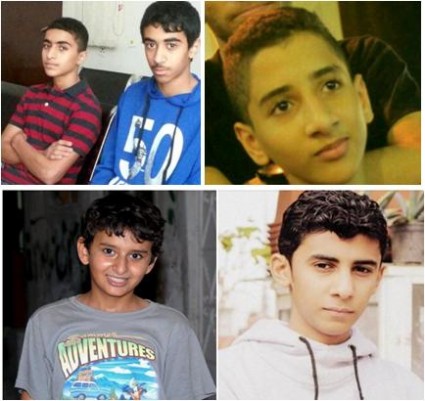
Left to Right: Mohammed Al Shawaikh, Hussain Al Saqai, Hussain Alhawaj
On 7 Dec 2012, Hussain Ali Al Saqqai (13 years old), Mohammed Abdulghani Al Shawaikh (13 years old) and Hussain Abduljalil Alhawaj (15 years old) were arrested from Manama following clashes between protesters and police, although to-date no evidence has been presented of them being part of it. According to information received by the BCHR, the children reportedly beaten and kicked in the head at the time of arrest. They were accused of attacking a police patrol and were taken to the public prosecution office. Mohammed Al Shawaikh and Hussain Al Saqqai were taken to the Juvenile prison in Isa Town while Hussain was detained for fifteen days at the Dry Dock prison with adults. Mohammed Al Shawaikh and Hussain Al Saqqai’s detention was extended twice to this day, as they are to be held in detention until December 27, 2012. …more
January 14, 2013 No Comments
Saudi and Gulf State Meddle in Bahrain Affairs in last Ditch Effort to Prevent Regime Collapse
January 14, 2013 No Comments
90 yo Haj Habib Ibrahim Abdullah murder by Bahrain Security Forces in Chemical Gas attack
Bahraini dies after inhaling poisonous tear gas
13 January, 2013 – PressTV
A Bahraini man has died after inhaling poisonous tear gas fired by Saudi-backed security forces as the Al Khalifa regime continues its crackdown on peaceful protests, Press TV reports.
Haj Habib Ibrahim Abdullah lost his life when Bahraini security forces attacked anti-regime protesters in Malkiya village near the capital Manama.
His nine-year-old grandson was injured in the incident and has been sent abroad for treatment
The funeral procession of the victim is due to be held on Sunday.
The Bahraini uprising began in February 2011. Manama promptly launched a brutal crackdown on peaceful protests, calling in Saudi-led Arab forces from neighboring states.
Dozens of Bahrainis have lost their lives since the revolution began in the Persian Gulf Kingdom.
Bahraini protesters say they will continue holding anti-regime demonstrations until their demand for the establishment of a democratically elected government is met. …source
January 14, 2013 No Comments
When State Violence comes calling Expect Resistance!
January 14, 2013 No Comments
We the People Demand, Freedom for Political Prisoners and our right to Life, Liberty and the Pursuit of Happiness
January 12, 2013 No Comments
Give A Tweet for Said Yousif Al-Muhafdha – tweet a pic of Human Rights Abuse in Bahrain
Bahrain- Human Rights defender Said Yousif Al-Muhafdha on trial for a tweet, still in detention
11 January, 2013 – Guldf Center for Human Rights
The Gulf Centre for Human Rights (GCHR) calls for the immediate release of human rights defender Said Yousif Al-Magadha, the Vice President and Head of Documentation Unit of the Bahrain Centre for Human Rights (BCHR), who is in detention since 17 December 2012 and is due for trial on 9 January 2012 for a tweet.
Al-Muhafdha was arrested while monitoring a protest in Manama on 17 December 2012, without any arrest warrant. He was charged with “disseminating false news over twitter” in relation to a tweet about a shotgun injury that was recorded couple of days prior to the tweet. On Wednesday 09 January 2013 he is due to stand for the first session on a trial facing the above mentioned charges.
This is the 2nd time Al-Muhafhda gets arrested while doing his duty as a human rights defender in reporting and documenting the violations of the security forces against the peaceful protesters. His arrest and the trial associated with it both clearly violate the spirit of article 6 of the Declaration on Human Rights Defenders adopted on 9 December 1998 which says “The right to receive and disseminate human rights information, and to draw public attention to human rights issues.”
It’s the belief of the GCHR that Said Yousif Al-Muhafdha is being detained mainly to hinder his legitimate human rights activities. The Bahraini government has used similar methods against the other leading human rights defenders who are currently imprisoned including the co-founders of the GCHR Abdulhadi Al-Khawaja and Nabeel Rajab.
The GCHR calls on the United States, the United Kingdom, the UN and all other close allies and international institutions to put pressure on the Bahraini authorities to:
Immediately release detained human rights defender Sayed Yousif Al-Muhafdhah and drop all charges against him. The GCHR believes that these measures have been taken against him solely due to his legitimate and peaceful work in defence of human rights, and freedom of expression in accordance to the Universal Declaration of Human Rights;
2. Immediately and unconditionally release all prisoners of conscience and activists including leading human rights defenders Abdulhadi Al-Khawaja, and Nabeel Rajab.
3. Immediately stop all actions that restrict freedom of opinion and expression, or prevent the transmission of information online.
4. Guarantee in all circumstances that all human rights defenders in Bahrain are able to carry out their legitimate human rights activities without fear of reprisals, and free of all restrictions including judicial harassment.
…source
January 12, 2013 No Comments
Thousands hit Streets Across Bahrain to Protest unjust imprisonment of Opposition Leaders
Thousands of Bahrain Arab Spring Protesters Denounce Government
12 January, 2013 – Democracy Chronicles
Bahraini security forces keep watch during clashes with Shiite Muslim protesters in the village of Malikiyah on January 7, 2013. Thousands of Shiites have demonstrated near Manama in a new protest against an appeals court upholding jail terms for 13 activists on charges of plotting to overthrow Bahrain’s monarchy, witnesses said.
Bahraini security forces keep watch during clashes with Shiite Muslim protesters in the village of Malikiyah on January 7, 2013. Thousands of Shiites have demonstrated near Manama in a new protest against an appeals court upholding jail terms for 13 activists on charges of plotting to overthrow Bahrain’s monarchy, witnesses said.
Thousands of Shiites demonstrated near Manama on Saturday in a new protest against an appeals court upholding jail terms for 13 activists on charges of plotting to overthrow Bahrain’s monarchy, witnesses said.
“We will not resign ourselves to it” and “we will not forget the prisoners,” shouted demonstrators during the peaceful protest that was monitored by a heavy security presence. Some carried photos of those convicted.
On Monday, the Court of Cassation upheld sentences ranging from between five years and life in prison against the 13, who took part in 2011 anti-government protests.
…source
January 12, 2013 No Comments
Full Spectrum Human Rights Abuse of Workers
From Saudi Arabia to the United States, the Human Rights of Domestic Workers Must Be Recognized
by Marianne Møllmann – 10 January, 2013 – RH Reality Check
Wednesday morning this week, news broke that Saudi Arabia’s authorities had gone ahead with the public beheading of Rizana Nafeek, a young woman accused of killing a baby in her care in 2005 when she was 17 years old. Nafeek insisted the baby had died in a choking accident.
The case had long been the concern of the international community, not only because the death penalty is inherently cruel and inhumane and should be abolished, but also because there are reasons to believe Nafeek had been forced into making a confession—which she later retracted—and that the trial against her was anything but fair. In addition, the young woman was a Sri Lankan migrant domestic worker in Saudi Arabia, had limited access to legal counsel, and is likely to have understood little of the legal proceedings, making the situation even more inhumane.
Rizana Nafeek, was among the approximately 1.5 million women, predominantly from Sri Lanka, Indonesia, and Philippines, working in private homes in Saudi Arabia. While some are treated well, domestic workers in Saudi Arabia enjoy fewer legal protections than any other type of workers, and human rights groups have documented horrific abuses against them, including physical brutality and deprivation of food, rest, and water.
But ill-treatment of domestic workers happens closer to home too. In the New York metro area there are an estimated 200,000 domestic workers, 99 percent of whom are immigrants. The abuse suffered by these workers was highlighted in a documentary in 2010, which also brought to light the lack of legal protection. Later that year, New York State became the first jurisdiction in the United States to pass a law to protect the rights of domestic workers.
In fact, most everywhere, domestic workers are subject to lesser legal protection than others, sometimes justified by reference to the difficulty in carrying out workplace inspections in private homes or the trite notion that domestic workers are treated as “part of the family.” In mid 2011, the International Labour Organization adopted the first international treaty on the rights of domestic workers, providing hope for scores of women who are, even now, working without legal protection.
This is not a niche issue either. Across the world, an estimated 53 to 100 million persons—most of them women and girls—currently work as domestic workers. Some travel from rural areas to the city, others cross borders with or without permission. Their main motivation is to improve the situation for themselves and their families.
And it is perhaps this, the most human of conditions, that is lost in the back-and-forth over how and why some people “deserve” rights and other don’t: the search for survival and dignity through work.
This week’s execution in Saudi Arabia and the successful fight for legal protections for domestic workers in New York State highlight the central concept of humanity in the struggle for human rights. Abuse is possible where domestic workers remain “other”—a foreigner, poor, a woman—and alone—isolated from their community and trapped in the workplace that doubles as “home.” Change happens when we start seeing each other as humans, deserving of dignity and respect. …more
January 11, 2013 No Comments
Saudi Protest met with intensified abuse of Women
In Saudi Town, Women Protest Detentions, Leading to Their Own
By CHRISTINE HAUSER – NYT Lede – 10 January, 2013
Last weekend, Saudi security forces encircled and arrested a small group of women who were protesting the long-term detention of relatives without charges on suspicion of terrorism, and the event has touched off nearly a week of unrest in the Saudi town of Buraida.
A video, apparently shot from a rooftop, showed the security forces joining hands to surround the women, who were holding up placards in the street, as reinforcements showed up.
Amnesty International reported in a statement that security forces arrested some 18 women and 10 children who had gathered outside Buraida’s Board of Grievances building to protest the continued detention of relatives in connection with the Saudi Arabian authorities’ counterterrorism efforts.
It said about seven women were released early the next morning after they signed and added their thumbprints to pledges not to protest again. Three of the women were believed to be at Buraida’s General Prison while eight more – all under the age of 30 – were transferred to the Social Welfare Home in the capital, Riyadh, Amnesty said.
Authorities in Saudi Arabia crack down on public demonstrations, and it is difficult to get a full picture of events inside the kingdom through the official or private media. But reports on social media and images uploaded on Twitter and YouTube filter out, helping to construct an idea of some of the political or human rights-motivated grievances there. …more
January 11, 2013 No Comments

